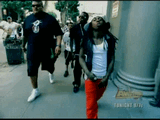I've seen a few people criticize Funeral for being "mumble rap."
To me, "mumble rap" is what certain people (usually people not from the south) call southern rappers when they rap in their natural dialect.
In the mid 2000s, Wayne incorporated a lot of east coast hip hop into his style with the way he spit and enunciated words. My theory is that a lot of people that discovered and liked Wayne during that time couldn't or didn't adjust when he switched his style up.
Thoughts?
To me, "mumble rap" is what certain people (usually people not from the south) call southern rappers when they rap in their natural dialect.
In the mid 2000s, Wayne incorporated a lot of east coast hip hop into his style with the way he spit and enunciated words. My theory is that a lot of people that discovered and liked Wayne during that time couldn't or didn't adjust when he switched his style up.
Thoughts?

















Comment